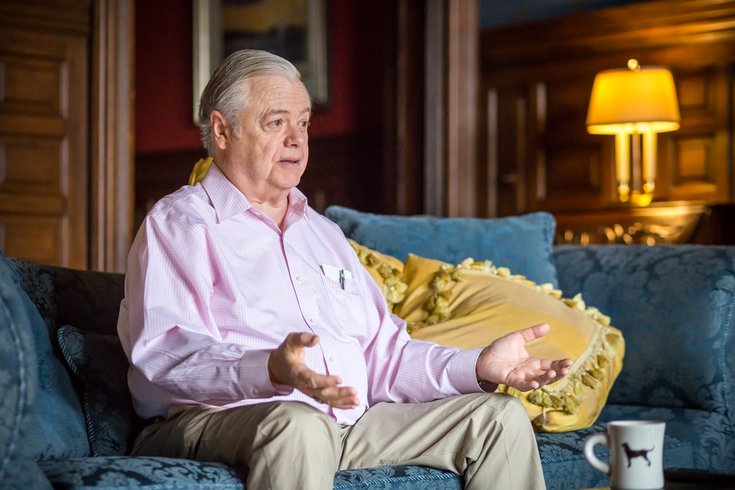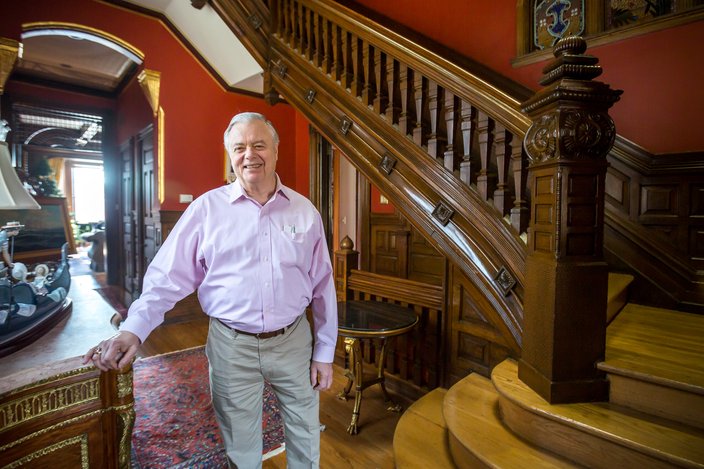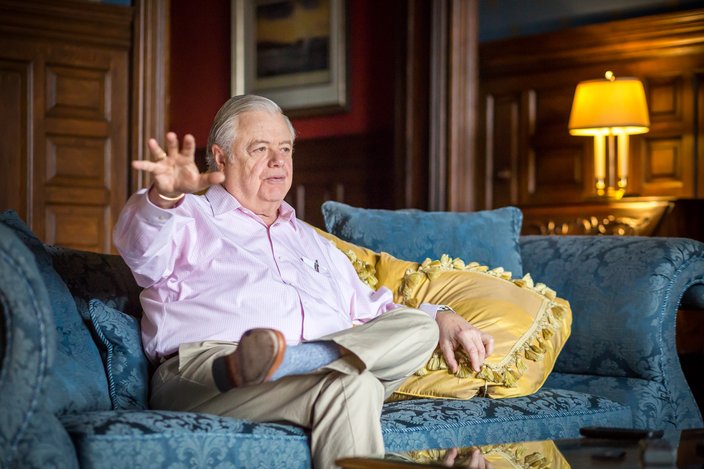
December 04, 2017
 Thom Carroll/PhillyVoice
Thom Carroll/PhillyVoice
Former state Senator Vince Fumo talks during an interview with PhillyVoice at his Spring Garden mansion. Fumo, who served a 61-month prison sentence after being convicted on 137 counts of corruption, remains adamant that he did nothing wrong.
Vince Fumo comes to the door of his fabled Spring Garden mansion and politely ushers a pair of visitors into the brownstone behemoth, located a short walk from the Benjamin Franklin Parkway.
Fumo – once lauded as the most powerful politician in Pennsylvania – renovated the 33-room mansion in the 1990s, adding heated sidewalks, an outdoor brick oven and an underground shooting range. Those amenities accompanied a refurbished elevator, seven fireplaces and 10 bathrooms.
READ AN EXCERPT: Vince Fumo's Dinner with the President
It is here that Fumo, now 74, served the final portion of a 61-month prison sentence – a punishment many critics deemed far too lenient for a conviction on defrauding the state Senate, the Independence Seaport Museum and a nonprofit Fumo helped start with millions of taxpayer dollars.
But eight years after his conviction on 137 federal corruption charges, Fumo is telling his version of the story. "I wanted to set the record straight," he says. "We were caught in an avalanche of negative publicity, of prosecutorial ... overaggression. And it was amazing."
Don't expect any form of mea culpa from the former state senator.
Fumo acknowledges that his staffers did personal favors on Senate time. He owns up to accepting power tools from Citizens Alliance and using its vehicles on trips to Martha's Vineyard. He admits to enjoying free yacht excursions from the seaport museum.
Insisting those actions do not amount to criminal behavior, Fumo believes that overzealous federal prosecutors, coupled with an irresponsible press, wrongfully toppled him from his lofty perch in Harrisburg.
That story is spelled out in "Target: The Senator: A Story About Power and Abuse of Power," a 432-page book written by Ralph Cipriano, an occasional PhillyVoice contributor who previously reported for the Philadelphia Inquirer, the same newspaper that Fumo claims didn't give him a fair shake.
With the book now on sale, Fumo sat down with PhillyVoice last week for a lengthy interview. Sitting on a blue Victorian sofa, Fumo discussed his powerful past, crippling conviction and uncertain future. Here are the highlights from that conversation:
PhillyVoice: What are you hoping readers take from the book?
Vince Fumo: I wanted to set the record straight. We were caught in an avalanche of negative publicity, of prosecutorial – I'd like to say misconduct but I better not. I'll say over-aggression. And it was amazing. At my sentencing, there were so many people trying to get in that they had to cancel it and move it downstairs to the ceremonial courtroom, which is huge. That filled up and there were people outside waiting in line.
And they weren't there to see me hung. They were there to be good to me and help me out .… They knew my record for what I'd done and thought that this was an injustice.
That was heartening. But the general public didn't know. After I came home, I would walk the streets. Still today, occasionally somebody will come up to me – a total stranger – and thank me for what I did. I'll say to myself, 'another happy customer.' Because it's moving.
We wanted to set that record straight and give some insight into how those things happened. That side of the story was never written in The Inquirer….
It was unbelievably one-sided in its media coverage. It was a mob scene. It wasn't that I was an evil guy. It was that public drama, I guess, loves when you get a big guy and bring him down – or even challenge him. I was a 10-point buck on somebody's wall and that was newsworthy. So, it was tough living with all of that. So, we wanted to set the record straight and say here's what happened.
I'm not saying I was a boy scout. But I wanted people to understand that. And I wanted people to understand some of our accomplishments….and that was it. Not only the process from that standpoint, but also the personal anguish of going through this. And the personal loss.
Former state Senator Vince Fumo poses for a photo on the first floor of his Spring Garden mansion, which boasts 33 rooms, including a sitting room, seven fireplaces and an underground shooting range.
PV: The book makes that impassioned defense, alleging that the prosecutors and the press gave you a raw deal. Why that approach versus a mea culpa at this point?
VF: Because that's what happened. One of the things they got outraged about was that I was not humble. I was not apologetic and I was not on my knees groveling to the court when I came back for resentencing. I said – I think it's somewhere in the records – “Judge, I cannot plead to something I didn't do."
I was never contrite. I was contrite about what went on at Citizens Alliance – that was a big mistake. But it wasn't substantial. I brought back to them $17 million. No one has ever questioned what that process was. If there was something wrong there, believe me, they would have loved to have done something. In fact, that's where they started out. They tried to show that this was extortion and it wasn't. So, I brought back $17 million and in the end I got back, over a period of five or six years, maybe $60,000 in benefits. Which would be tools and bullshit like that.
In fact, Eddie Jacobs, during his closing said, “If somebody brought in that kind of money, Citizens Alliance could have easily given him a dinner honoring him. They could have given him a Rolex watch. He doesn't need a Rolex watch. They could have done all these different things that would have cost far more than the amount of money involved here and no one would have said a word.” So what in the sense is the big deal?
PV: The book makes clear you owned up to the actions laid out by the prosecution. But the question is whether they are criminal. Where do you draw the line on what is maybe pushing the ethical boundaries of politics but not yet criminal?
VF: In my case, their big complaint was the staff is doing all these personal things for me. As I understood what they were prosecuting me for, it would have been OK for me to say, “David, who was my driver, David, drive me. I'm going to go down to the laundry to pick up my shirts.’ That would have been OK. But it wasn't OK for me to stay in my office, eat lunch in my office, work in my office and say, “Hey David, while I'm doing this, will you go down there and do that?”
I'm big on efficiency – rather than have David sit around waiting for something to do. Well, they made that into a federal crime. Mail fraud. I remember at the trial, very vividly, they brought in the chief clerk from the Senate. Of course, he was scared to death. They prepped him and they said to him, “Here's the story.” We asked him, “what kind of personal things can a secretary do for a senator?” Well, probably make one appointment a month. I'm looking at him, “Are you crazy?” We've been up there together for 30 years. One appointment? Just one doctor's appointment and if I have two, she can't make it? Stop this, it's crazy.
"I teach people, and show people, how to get shit done with brains, balls, loyalty and leverage." – Vince Fumo
And then they asked him, “Would it be OK for a Senate employee to be paid by the Senate and then go and run a nonprofit?” “Oh, absolutely not. Absolutely not.” I took the position that Citizens Alliance was an arm of our office for constituent services. I had Ruthie [Arnao] run it from our office. She would manage it. They went crazy over that. That became another federal crime.
In life and in business, you tend to take a look at the overall picture. What did, in this case, the state and city of Philadelphia get out of my service, with all that alleged nonsense? And what did society get out of it? Well, an awful lot.
People there worked a helluva lot longer than the 37.5 hours that somewhere in the Senate became a tradition. There were no time clocks. The only time 37.5 hours became important – we looked and tried to define how many hours we're supposed to work. Again, it's vague in the Senate. It's never been straightened out. We found something, somewhere, that said it should be 37.5 hours. So, we plugged that in and everybody worked longer than that. But that was irrelevant.
PV: The author, Ralph Cipriano, interviewed several jurors. A couple of them had come forward to say that your testimony at trial persuaded them, in part, to convict you. And they particularly mentioned a line that you made during the trial – that spitting on the sidewalk is illegal, but it's not enforced. After hearing some of their comments, do regret taking the stand? Or anything you said on the stand?
VF: No, I think I had to take the stand. I'm a firm believer, because I also did defense work as a lawyer. I'm a firm believer that the jury wants to hear the other side of the story and they want to hear it from the defendant. Unless there is some strong reason why you don't want to put your client up there. And I got up there.
Their idea of the truth becomes whatever agrees with their theory. Anything that disagrees with that theory is perjury. Forget whether it's in fact true or not. That's their belief and that's the way they operate. When I said 'spitting on the sidewalk' it was in the context of a longer answer and it was a vitriolic exchange between me and the prosecutor. I lost my cool in that one particular event.
They also got angry, as I understand it, that I had the audacity to say that the only thing I had to do as a Senator was go to the Senate and vote. And that was it. The judge at the resentencing said, ‘I looked at everything. I looked at the [state] constitution and he's right.’ That's the only obligation I had. But these people were upset by that. Well, that's not my fault. I did more than what the constitution required.
When Ralph interviewed those people, a good number of them admitted that they violated their oaths, that they were reading the newspapers, that they were getting information from people that was inflammatory and never reported it. That's when I got angry and I wrote that letter from prison that they were – I think I basically said "corrupt" or something like that. Because you took an oath.
Fumo sips coffee during an interview in the first-floor sitting room at his Spring Garden home. “Fortunately, I was able to hold onto this house, which the government wanted in the worst way,” he says. “I'm surviving. I'm not bitching. I'm doing pretty damn good for a person of my age, having been through what I've been through.”
PV: One of the quotes in the book – by Arthur Shuman Jr. – was that “the jury didn't convict Vince Fumo. The Philadelphia Inquirer convicted Vince Fumo.” Do you agree with that and, if so, what did you feel was the newspaper's biggest failing in its reporting?
VF: That's where there's no courage. And that's where there's no fairness. And that's where, in many cases, the media fails to do its job. It doesn't have to get up and say what a great guy Vince Fumo is. But it's got to be fair and balanced. If I were Jack the Ripper, OK, there's not much good to say about me.
But they couldn't deny that. And the fact that you were participating in a criminal act of getting information from a grand jury – which is secret – you should be writing a story about that. Guess what came over? Or if you really want to be honest, I met so-and-so in the FBI and he handed me this envelope. Why isn't that wrong? Why isn't that reportable? If you gave both sides of the story, you'd at least let the information come out in an equal fashion, it wouldn't be as one-sided.
PV: Did you think the sentence issued by Judge Ronald Buckwalter was fair? And how do you respond to people who think you got off light?
VF: As I said when the reporters asked me the same question, as we were going into the going-away party, I said, “I'll tell you what. If anybody thinks I got a light sentence, I invite them to come along with me and then make the decision.”
When I was being sentenced that day, I guess I was numb. Everybody was worried, including my family and [then-fiancee] Carolyn [ZInni] and everybody else. These guys are yelling and screaming 18 years, 17 years. I said, “No way in hell.” I said to myself, anywhere from three to seven. Somewhere in there is where this is going to come down. And I was right. It came down to less than five.
I wasn't happy about it, but it was realistic. It was the money side that really hammered me. It cost $4.5 million – million – in fines and restitution. When you get out and you have to start paying it – and you're finding out how much you paid – and now you're up against it. You lost your pension. You've paid $4.5 million. You paid lawyers another $2 million. The numbers are staggering. Absolutely staggering.
PV: What message does your story send to politicians today in 2017? We've seen several prominent elected officials sent away for corruption charges.
VF: What it says to current politicians is – you will do your job the way the federal prosecutors think you should do your job. In addition, you’d better always be careful walking that road that you don't slip up on something new that they decide. And if they target you, they're going to find something.
"I was in the [Senate] majority three years out of 31. And yet ... I was the most powerful guy. Not the majority. How did I do it? Leverage." – Vince Fumo
That's what it says. And as a result, take a look at what's going on in Harrisburg. They haven't had a budget in three years. When I was there, balancing the budget wasn't a big deal. I mean, it may have been tough and it may have had to make cuts and you may have had to put taxes on, but you did your job.
It's unfathomable to me, that they don't have a budget as of today. They passed the spending plan, but they didn't pass the funding part. It's like what's going on? That's basic 101. But that's what they're doing. They're scared to death and that's not the way it should be in democracy.
PV: When you look at Harrisburg today and you see the budget stalemates that you noted, and you see the funding cuts to the education system, do you think it would be different if you were still there and not sitting here?
VF: I do. Even though people say, 'Well, it's changed,' and 'He don't understand.' Well, they're saying that because they're there and can't get it done. They don't want somebody to come in and show them how. ... We always said “Get Shit Done” – GSD. We had these shirts made up one time for the staff (that said) GSD and on the arm, over here, was BBLL. To get shit done you have to have brains and balls. And you've got to understand loyalty and leverage.
I was in the majority three years out of 31. And yet, if you read any account of me, from one end of the state to the other, I was the most powerful guy there. Not the majority. How did I do it? Leverage.
Vince Fumo gestures as he makes a point during his interview with PhillyVoice. Fumo says his conviction on felony federal corruption charges marked him with a “scarlet letter F.”
PV: What do you miss most about being one of the most powerful politicians in the state?
VF: I miss getting shit done. I've always said to people that being in politics, if you're a real player and you're involved with the game, it's like being a star quarterback in the NFL without ever having to worry about your knees giving out or getting old. You can pick a fight every day if you want to get out and get some exercise.
It's time consuming. It requires an awful lot of concentration and intelligence. And, also, it involves a personality – a leader with magnetism – that can get people to go along with him. Because they don't want to do this. They don't like anything hard.
I miss that. They all talk about [Pennsylvania state Sen. Scott] Wagner in the Senate, being the tough guy for the Republicans. He rules the world and you wouldn't know how to deal with him. I can deal with Scott Wagner today, if they would let me.
PV: What do you see for your future?
VF: I think, so far, I've developed a good practice of giving people advice. I remember a long time ago seeing a sign in an office – a lawyer's stock and trade is his advice. That's what I do. I have clients that want to get something done or want to stop something from getting done.
Having been through this for 40 years now, I know how to do that, pretty much. You don't. You know how to make $1 million a day doing what you're doing. But you don't know how to take care of this problem over here with the state, with the community, with the city. That's what I do. And I give strategic advice. And if they still want advice on business, I still got my MBA. I do that.
People forget that I was a successful businessman. With that bank, I took them from $1.1 million to a half billion and sold it for $100 million. I walked away with $12 million, after tax. The government got it. That's one of the things I joke about – the case cost me $10 million. When I got the money, I paid off all of my mortgages, gave my kids a trust, and then I had this excess money. In a moment, it was gone. I never had the chance to enjoy it, so I don't miss it.
I teach people, and show people, how to get shit done with brains, balls, loyalty and leverage. I don't lobby because I don't want the aggravation of my client getting beat up.
PV: What are your biggest regrets when you look back on your career?
VF: God, there's so many. First of all, my family. There's no question about that ... So, yeah, I lost that. Although the criticism with respect to my first two kids is really unfounded. When I came home after we did the budget, in mid-July, I went down the shore for two months. I took them with me. I hired a nanny to come with me. I taught them how to drive boats, how to do all kinds of things and they loved it. I didn't get to spend time over here. But guess what, I made up for it over here. But kids, if they want to bitch, they can always find something.
And then I miss all the things that I was able to do for people. I still get people calling up (asking) “can you do this or that.” And if I can help them, if I can call up a senator and say, “Can you do me a favor, he's one of your constituents,” I can get some access. But it's not like being able to bring back $8 billion dollars.
I lost my law license. I also gained the scarlet letter “F” as a felon. Now, to people that love me and know me, it doesn't mean shit. And to people that understand the case, it's bullshit. Even people that are my close friends that have boards of directors, I can't get on that board. I wouldn't even ask them to get on that board. Because even if I did, boom, enormous negative publicity. So, you don't get the chance to use your intelligence, your skills in that regard. You're precluded from that. So, I miss that.
That's it. Fortunately, I was able to hold onto this house, which the government wanted in the worst way. I'm surviving. I'm not bitching. I'm doing pretty damn good for a person of my age, having been through what I've been through. And I'm optimistic about the future. Every time I was down, I always came back stronger.
I'm optimistic that in addition to my regular practice, I'm going to hit a home run. Like I always did, I have four or five irons in the fire. Maybe none of them will come true. If one of them does, it's a home run – a grand slam, home run.
That will make me really happy, at least as far as getting back some self-confidence and some money and say to my other practice, I don't need you guys anymore. I hit the lottery. I'll let you call me if you have a problem for free, but I don't need to do that any more. That would be nice. Will it happen? Maybe.
 Thom Carroll/PhillyVoice
Thom Carroll/PhillyVoice Thom Carroll/PhillyVoice
Thom Carroll/PhillyVoice Thom Carroll/PhillyVoice
Thom Carroll/PhillyVoice